DEMOGRAPHIC CHARACTERISTICS AND COGNITIVE FUNCTION IN PATIENTS WITH MEMORY IMPAIRMENT
Main Article Content
Abstract
Background: Cognitive impairment and dementia are increasingly serious health problems in the elderly. Recent studies have recorded a significant increase in the number of people with dementia coming to medical facilities with complaints of memory loss. This shows the importance of early screening and diagnosis of cognitive decline and dementia. Research on demographic characteristics and assessment of patients' cognitive function using the MMSE scale helps to have a comprehensive view of the disease pattern of this disease. Objectives: Describe demographic characteristics and evaluate cognitive function of patients with cognitive impairment using the MMSE scale at Ho Chi Minh City University of Medicine and Pharmacy Hospital. Methods: Cross-sectional descriptive study of over 100 patients with complaints of memory loss examined at the Neurology Clinic of Ho Chi Minh City University of Medicine and Pharmacy Hospital. Ho Chi Minh from January 2023 to June 2023. Results: The average age of the study subjects was 69.9; The youngest is 60 years old and the oldest is 87 years old. Females predominate, female/male ratio = 1.56/1. Primary education level accounts for 31%. The occupational group with the highest proportion is farmers with 37%. Among comorbid medical conditions, hypertension accounts for 63%. 90% of study participants had cognitive impairment. There was a difference between educational level and occupation between the group with cognitive impairment and the group without cognitive impairment (p < 0.05). Conclusion: Cognitive decline and dementia are common diseases in the elderly, with a predominance in women and people with low education levels. Assessing cognitive function using the MMSE scale on people with complaints of memory impairment, at the cut-off point of 25, 90% of cases have impaired cognitive function, including mild cognitive impairment and dementia.
Article Details
Keywords
dementia, MMSE, cognitive impairment
References
2. Nguyễn Kim Việt (2009). “Nghiên cứu đặc điểm sa sút trí tuệ tại cộng đồng”. Tạp chí Y Học Thực Hành. 10(679), pp. 16-18.
3. Nguyễn Thị Minh Ngọc, Nguyễn Ngọc Hoành Mỹ Tiên, Nguyễn Trần Tố Trân và cộng sự (2021). “Tỷ lệ suy giảm nhận thức nhẹ, sa sút trí tuệ và các yếu tố liên quan theo thang điểm MoCA ở người bệnh cao tuổi tại phòng khám lão khoa, Bệnh Viện Đại Học Y Dược Thành Phố Hồ Chí Minh”. Tạp chí Y học TP Hồ Chí Minh. 25(2), pp. 182-187.
4. Nguyễn Vân Anh, Phạm Thành Trung, Tống Mai Trang và cộng sự (2022). “Giá trị tầm soát sa sút trí tuệ khi kết hợp thang điểm MMSE và thang vẽ đồng hồ (CDT)”. Tạp chí Y học Việt Nam. 10(679), pp. 328-333.
5. Canavan M, O’Donnell MJ (2022). “Hypertension and Cognitive Impairment: A Review of Mechanisms and Key Concepts”. Front Neurol.13. Accessed September 15, 2023.
6. Han F, Luo C, Lv D, Tian L, Qu C (2022). “Risk Factors Affecting Cognitive Impairment of the Elderly Aged 65 and Over: A Cross-Sectional Study”. Front Aging Neurosci.14:903794. doi:10.3389/fnagi.2022.903794
7. Peterson DJ, Gargya S, Kopeikin KS, Naveh-Benjamin M (2017). “The impact of level of education on age-related deficits in associative memory: Behavioral and neuropsychological perspectives”. Cortex. 91,pp. 9-24. doi:10.1016/ j.cortex.2016.12.020
8. Ungvari Z, Toth P, Tarantini S, et al (2021). “Hypertension-induced cognitive impairment: from pathophysiology to public health”. Nature Reviews Nephrology.17(10),pp.639-654. doi: 10.1038/s41581-021-00430-6


